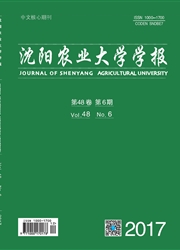

 中文摘要:
中文摘要:
Hsp90基因是真核生物中广泛存在且非常保守的热激蛋白基因家族中的重要成员,在生物的抗逆胁迫过程中起重要作用。从番茄基因组扩增Hsp90基因,连接到载体pCAMBIAl302上,构建了表达载体pCAM—Hsp90,利用实时定量荧光技术检测了番茄接种南方根结线虫后Hsp90基因的表达水平,结果表明:在20~25dpi后番茄根部S1一Hsp90基因大量表达。此外,南方根结线虫的雌虫和二龄幼虫J2的Mi—Hsp90基因在高温和低温胁迫时表达量都高于对照,而且在35℃时表达量要高于4℃时的表达量,在J2中的表达量高于雌虫的表达量。说明Hsp90基因在番茄抗线虫侵染以及线虫适应环境方面起到非常重要的作用。南方根结线虫J2在35℃高温下Hsp90的高表达使其能够保持较高的活力并侵染番茄的根部,从而使南方根结线虫更适合在较高温度下生存。本试验进一步证明热激蛋白在番茄抗线虫侵染和线虫对环境的适应性过程中起到重要作用,同时为利用生态控制的方法防治根结线虫病害提供理论依据。
 英文摘要:
英文摘要:
Hsp90 had been identified to be highly conserved among different species. The Sl-hsp90 gene of tomato was amplified from Solarium lycopersicum L-402 euhivar genome DNA by DNA-PCR method. The plant expression vector pCAMBIA1302 containing Sl-hsp90 gene was constructed. Meanwhile, we quantitatively investigated the changes in the total mRNA levels of Hsp90 in tomato roots treated with Meloidogyne incognita. Expression levels of Sl-hsp90 were examined by fluorescent real-time PCR. The stability of mRNA was estimated. It was found that Hsp90 was more inducible after nematode infected. In addition, females and second-stage juveniles (.12) of M.incognita were exposed at 4℃ and 35℃ for different times in order to explore the impact of adverse temperature on Mi-hsp90 gene expression. Expression levels of Mi-hsp90 on 35℃ in females and J2 were more than that of Mi-hsp90 at 4℃. At 35℃ a burst of expression for Mi-hsp90 was observed in J2 after 2h of heat shock treatment, then expression dropped, although remaining still relatively high after 24h. Female and J2 are more suitable for high temperature. We established the Hsp90 high expression in nematode stressed by temperature and tomato roots infected by root knot nematode.
 同期刊论文项目
同期刊论文项目
 同项目期刊论文
同项目期刊论文
 期刊信息
期刊信息
